Today, we release the findings of our Mental Health In The Legal Profession Survey 2021, our first annual survey to better understand a) the mental health concerns facing aspiring lawyers and b) how law firms can support the mental health of incoming trainee solicitors.
Background
This survey was prompted by a preliminary survey we carried out at the beginning of the second UK lockdown (November 2020). This preliminary survey of 116 aspiring lawyers found that most (58%) of the respondents regularly feel stressed about their legal careers. A majority (52%) would characterise this stress as moderate, while over a quarter (27%) characterised this as severe or extreme stress. We sought to better understand the reasons behind this stress.
We are also keenly aware that the nature of the legal profession is changing. In the TCLA forum, the largest dedicated forum for UK aspiring lawyers, we see the open and active discussion of mental health in a way we have not seen before. Many of our members are entering the legal profession with public fears and doubts over the impact of a legal career on their mental health. Amid reports of 105-hour weeks at Goldman Sachs and sleep deprivation at Apollo Global Management Inc., we worry about the future health of our members, and we feel it is our responsibility to share these concerns with the wider legal profession.
Finally, the purpose of an annual survey lies with our desire to see the normalisation of mental health discussions and a change in perception from senior leaders. It is our view that if law firms want to attract the best talent, keep that talent, and see that talent become future partners of their firm, they must aggressively address the mental health concerns from incoming trainee solicitors. We hope to highlight the fundamental issues and provide practical solutions for law firms to take action.
Survey Lessons
This was our first annual survey. We openly admit that we have learned that some questions work better than others, some categories would benefit from tighter descriptions, and some questions’ options could have been capped. While we still feel this survey offers substantive value in providing an insight into the perceptions of aspiring lawyers, we expect to take these lessons away and improve the quality of findings in our next survey.
Survey Demographics
Our audience is made up of aspiring lawyers, primarily those who are in the process of applying for training contracts with the largest commercial law firms.
Of the 225 respondents who completed our survey:
- 83% were female and 17% were male.
- 40% were the first in their family to go to university.
- 64% attended a Russell Group university and 30% attended a non-Russell Group university for their undergraduate degree.
- 67% were ‘currently applying’ or ‘planning to apply’ for vacation schemes and training contracts, 25% were future trainee solicitors, 3% were trainee solicitors, associates, or above, and 5% were deciding between career options or selected ‘other’.
Survey Results – Summary Findings
Section 1: Do aspiring lawyers have concerns over their mental health?
Our survey found:
- 86% of respondents ‘sometimes’, ‘frequently’, or ‘always’ experienced issues with their mental health over the past month.
- 93% of respondents ‘sometimes’, ‘frequently’, or ‘always’ experienced issues with their mental health over the past year.
- 84% ‘sometimes’, ‘frequently’, or ‘always’, have/had concerns over their ability to manage the stress of a training contract.
The biggest concerns respondents had for their training contract included the following (in order of popularity):
- Imposter syndrome in respect of the work
- Lack of time for self-care, including exercise and sleep
- Making a mistake in the workplace
- Managing the hours and work life balance
- Managing workload and deadlines
- Imposter syndrome in respect of the social environment
- Demands of superiors
- Managing mental health in the workplace
- Career progression
- Disclosing a mental illness
Respondents were asked to expand on the reasons they had chosen in this question. From this, we have summarised the recurring themes as follows:
- No room for failure: Respondents frequently discussed their fears of failing in an environment which they felt demanded ‘utmost excellence’ and offered ‘no margin for error’. Commonly cited factors for this perception included the prestige and atmosphere of law firms, as well as the number of articles covering junior lawyers being fired for mistakes, and recent judgements by the Solicitors Regulation Authority.
- Mental health perception: Respondents frequently cited fears over their inability to get help or discuss mental health when beginning their training contract. A common reason included ‘being seen as weak’ by superiors, a perception that mental health would not be treated by law firms ‘in the same way as other illnesses’, as well as concerns that mental health disclosures could ‘hinder progression’.
- Demands of superiors: Many respondents felt that supervisors did not respect a trainee solicitor’s need for ‘basic self-care’, including sufficient sleep and exercise. Some identified that this would exacerbate existing mental health issues, including anxiety and depression, and ultimately lead to burnout.
- Unequal treatment: A sizeable minority of respondents discussed fears over being ‘treated differently’ or ‘feeling isolated’ because of their socioeconomic or ethnic background.
Section 2: How do aspiring lawyers perceive the mental health support provided by law firms?
Two particular findings stood out to us here:
- 68% ‘strongly disagreed’ or ‘somewhat disagreed’ that they would be comfortable discussing their mental health concerns with graduate recruitment at a law firm.
- 67% ‘strongly disagreed’ or ‘somewhat disagreed’ that they would be comfortable discussing their mental health concerns with the lawyers at a law firm.
Respondents were more neutral when asked about their perception of a) the mental health support provided by law firms being sufficient and b) whether senior law firm leaders cared about their mental health. In both cases though, only a minority agreed.
On a more positive note, a slight majority (52.9%) of respondents felt they had the strategies and knowledge to handle stress in the workplace.
Section 3: What support do aspiring lawyers want to see from law firms in respect of their mental health?
The solutions identified included the following (in order of popularity):
- Changes to the workplace
- 1 on 1 support such as counselling
- Check-ins with supervisors
- Peer support, such as mental health groups within law firms
- Live training, such as mental health and resilience training workshops
- Raising awareness, such as talks about mental health from lawyers
Again, a number of recurring themes were found when respondents were asked to expand on their answers:
- Changing lawyers’ attitudes: Many respondents felt the largest problem was not with the initiatives being run, but the attitudes of lawyers within the legal profession, pointing to negative judgement from senior lawyers and a mentality of ‘I had it tough, so you must too’. Suggestions included ‘training for existing lawyers who have not had mental health issues’ and normalisation by having senior lawyers ‘openly discuss mental health issues’.
- Counselling: Many respondents who cited fears over the consequences of mental health disclosure praised the idea of confidential counselling, ensuring trainee solicitors don’t face negative consequences as a result of disclosing mental health illnesses.
- Mentoring, supervision and peer support: Respondents called for more active support from firms through a range of methods, including a ‘neutral mentor’, a support group for peers to openly discuss mental health concerns, and supervisors carrying out active check-ins, beyond mental health awareness weeks.
- Better training: Some respondents cited concerns over feeling unprepared for a training contract after the Legal Practice Course, calling for tailored training on ‘how to be a trainee’.
Survey Results – In Full
Note, the open ended questions have been taken out this section.
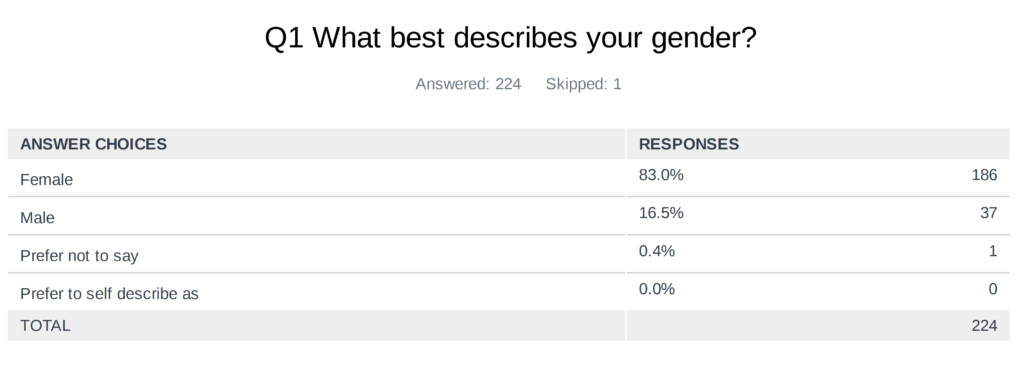
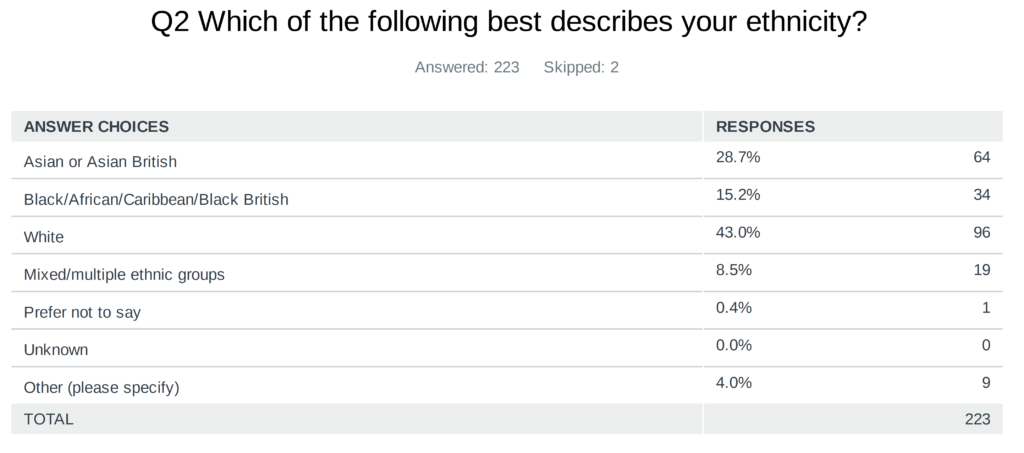
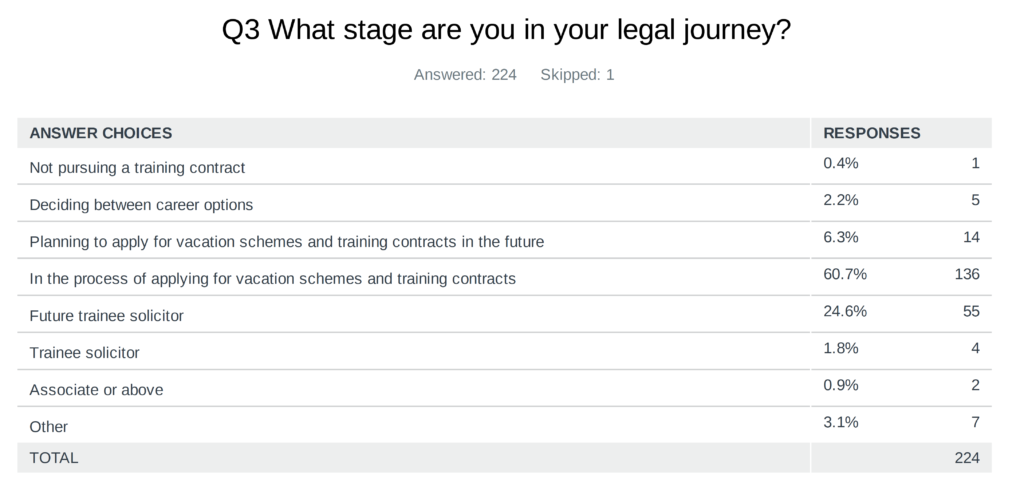
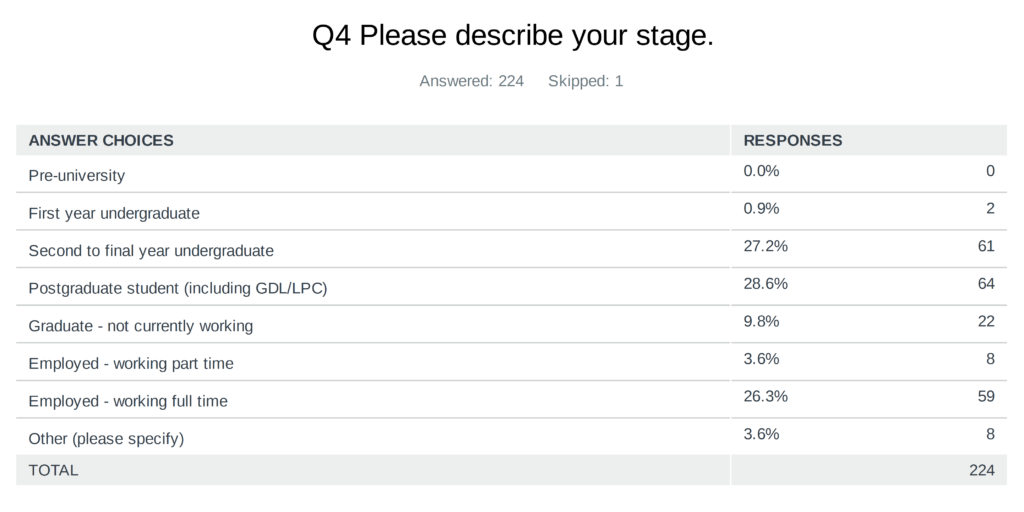

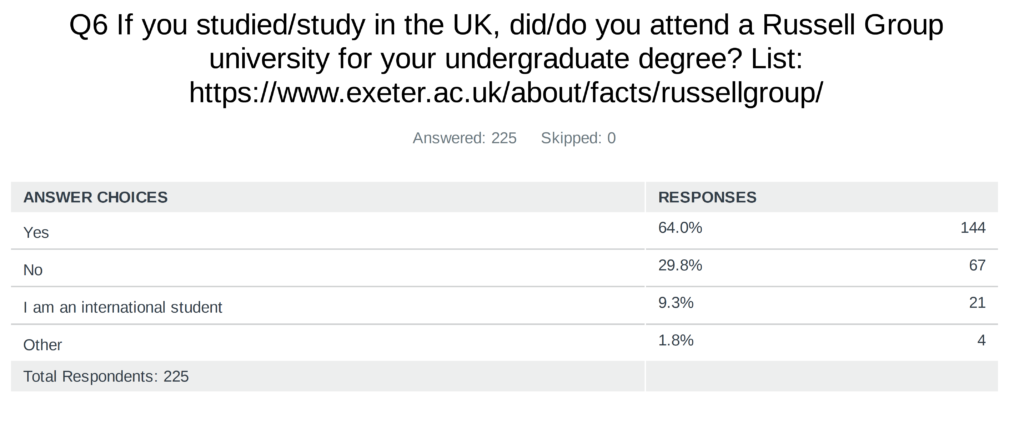
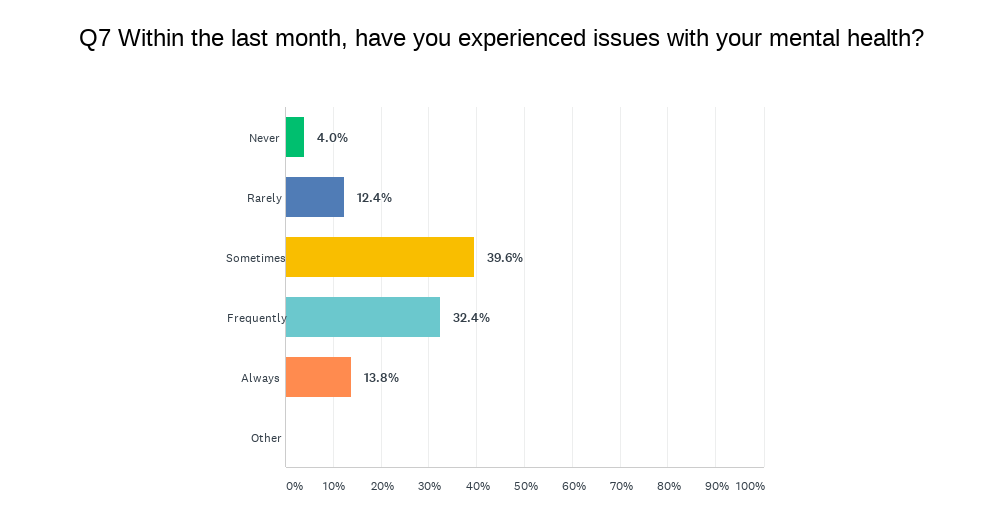
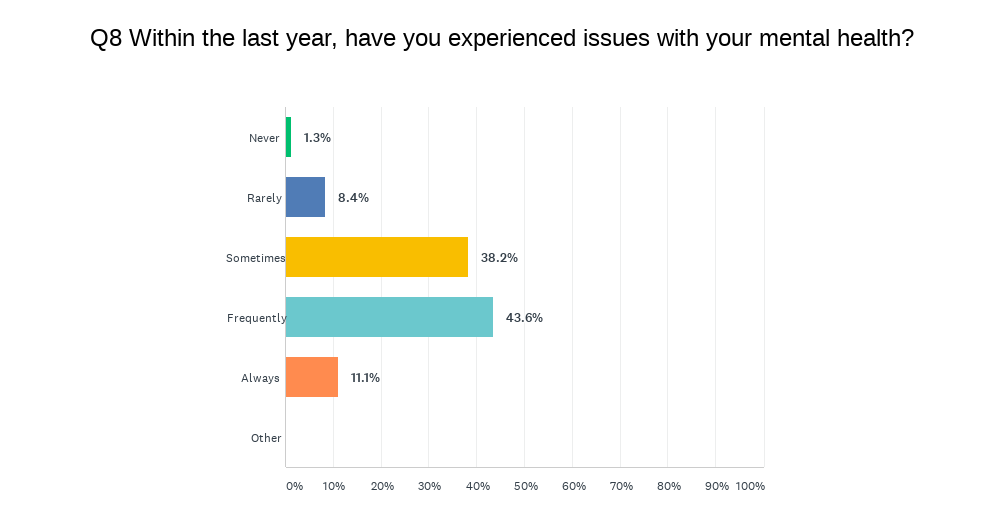
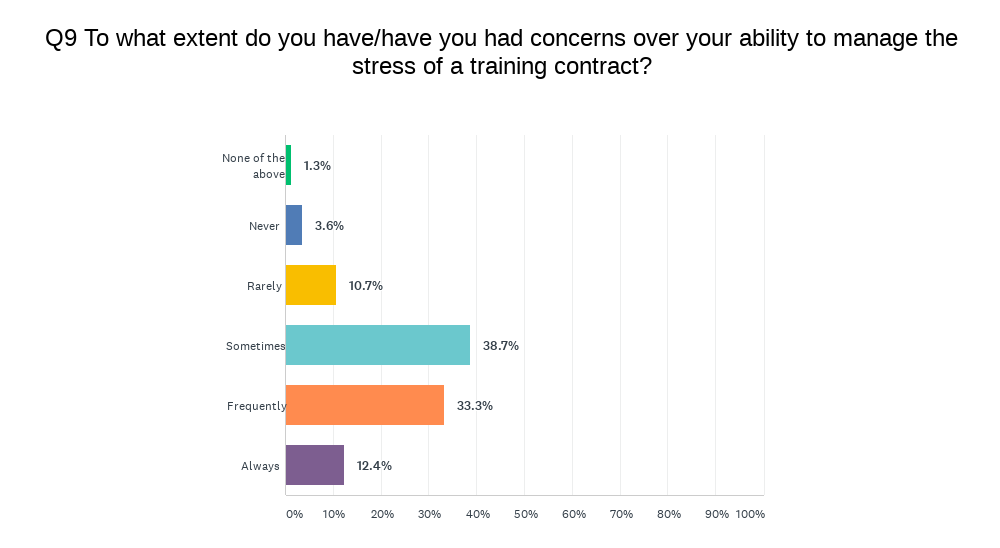
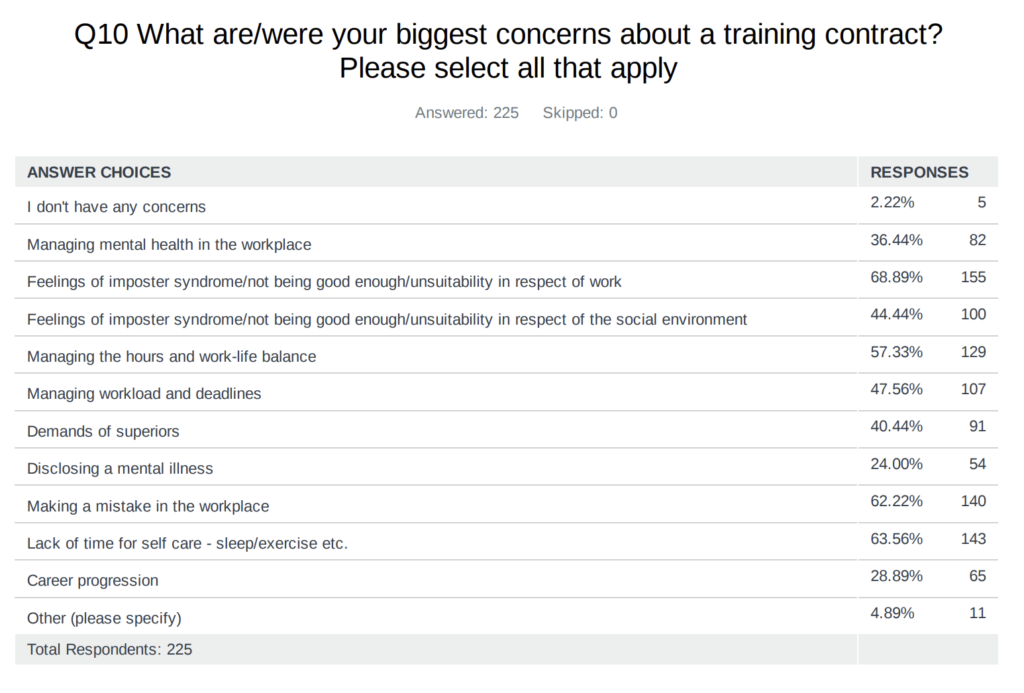
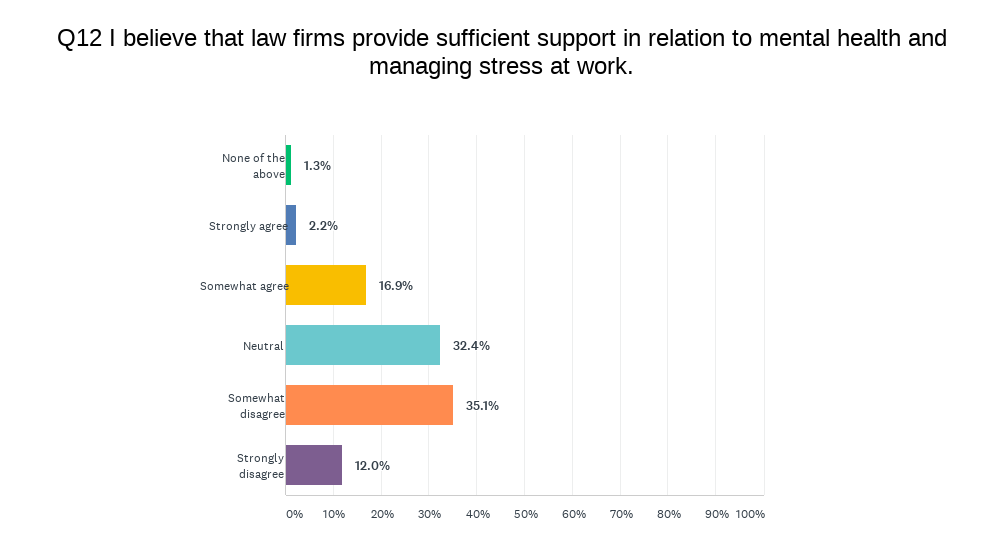
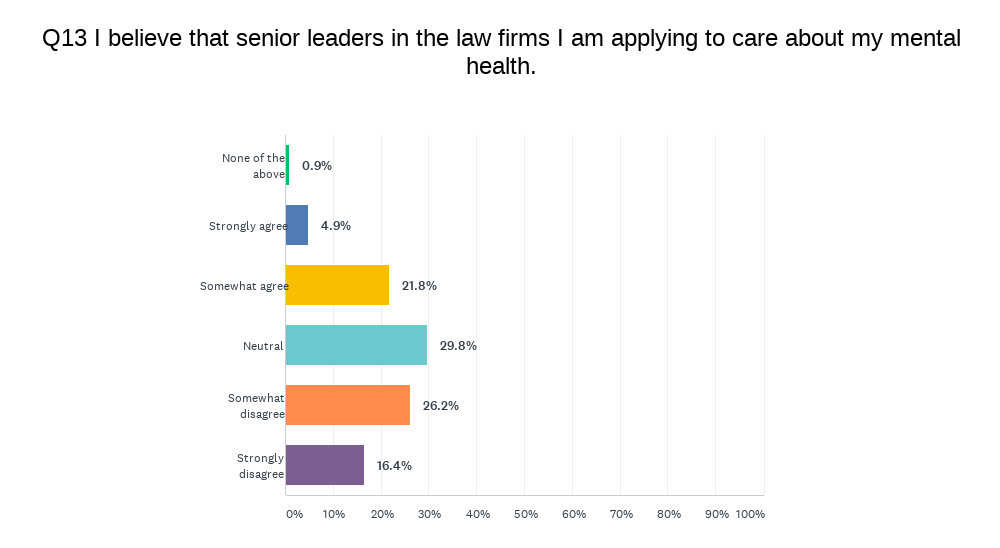
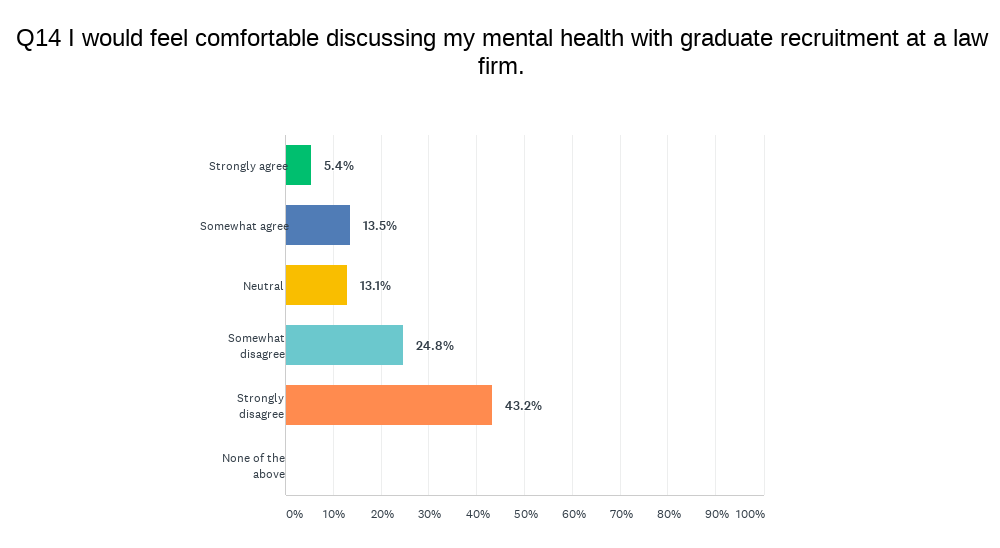
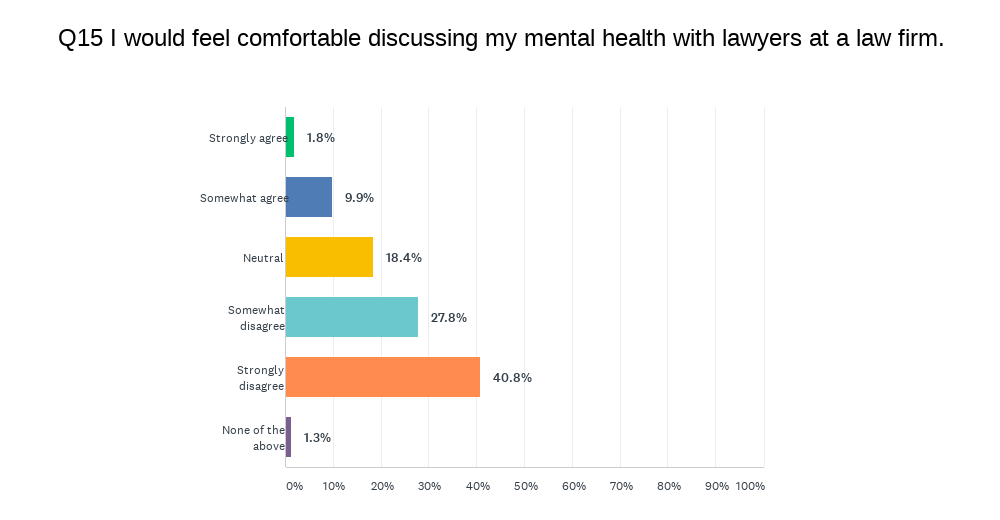
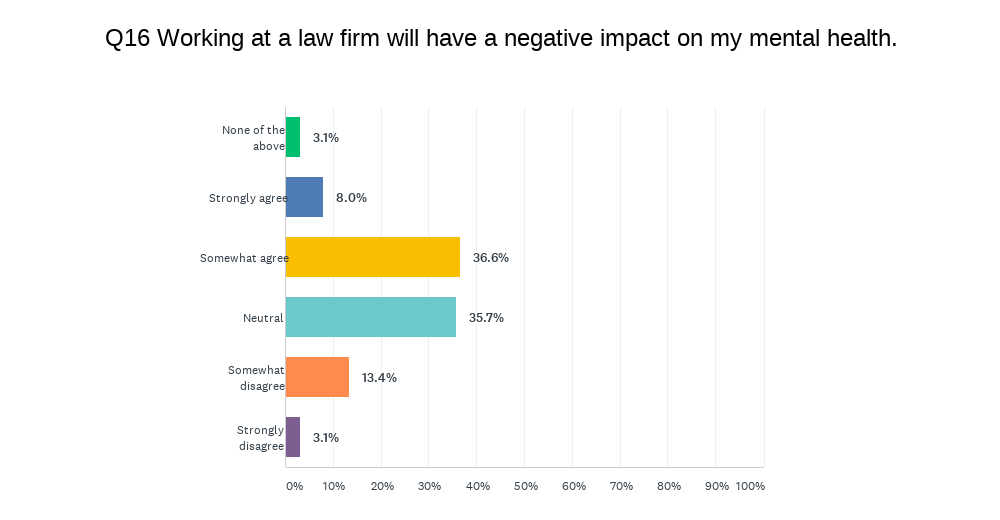
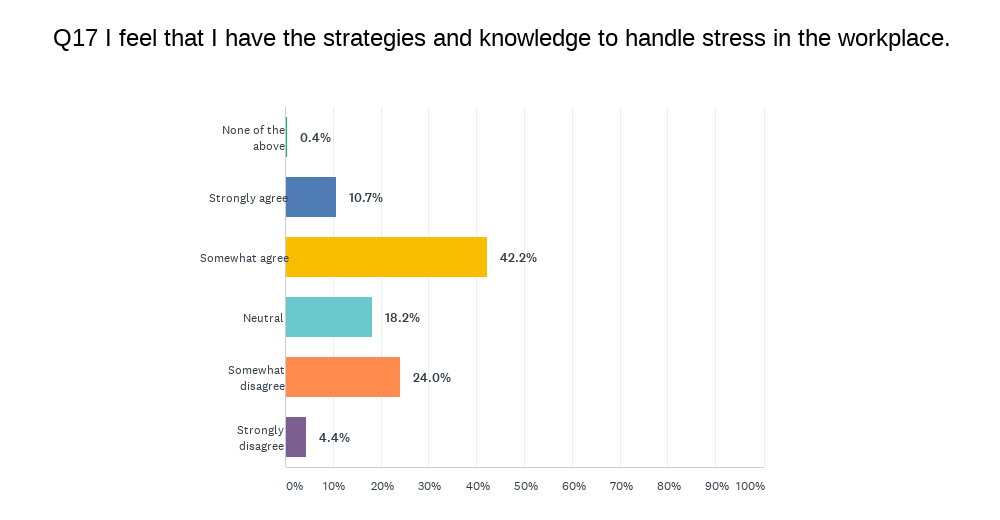
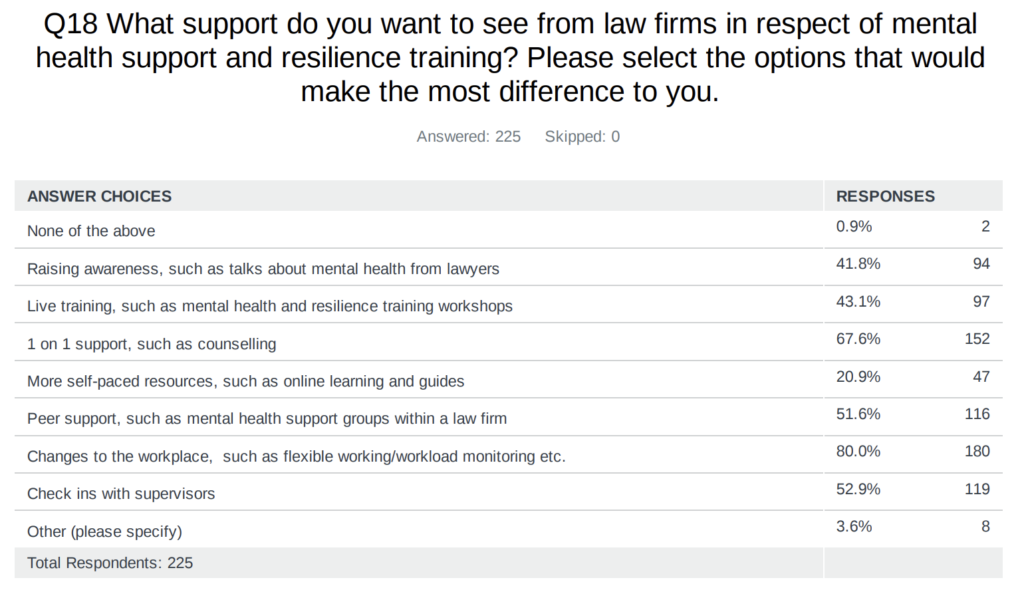
Survey Results – Selected Responses
Q11: Why did you choose the option above? (Concerns relating to a training contract)
“The bridge between LPC and the work taken on by a trainee (and level of responsibility given) seems quite extreme… the mental attitude required at trainee stage isn’t really developed during LPC. Also NQ positions are competitive and you hear too many horror stories of making mistakes having an impact on your progression as a trainee. I’m personally not confident that the preparation given at LPC level matches the preparation required for trainee life.”
“I think my biggest concern is to do with managing expectations and the pressure. I can get anxious and I am concerned about supervisors not being understanding of making mistakes, or if I don’t pick up the skills of the work quickly enough. Further I am afraid of burnout from too little sleep due to long work hours. For me, running and working out in general is really important for managing my stress and maintaining a healthy mind, and I am concerned that I may not have time to prioritise this in the job.”
“As a trainee I want to do high quality work but I have concerns about whether I will be able to maintain this high level when consistently working long hours in a high pressure environment with little support. Having enough time outside of work for self-care allows me to be more productive and feel more confident with my work but I am concerned that I won’t have this time as a trainee.”
“I don’t feel comfortable disclosing my mental health or disclosing it to the degree it is having an impact on my life. As a result, I am worried about how I would manage or if I would burn out.”
Because of perceptions surrounding law firms. It seems extremely high pressure with very little to no room for error.
There have been a lot of expectations on trainees to be “on top of their games”; making mistakes or dealing with time / work pressure can increase the stress or anxiety levels trainees are already experiencing.
“We frequently hear about how demanding a law career is. In a lot of firms, late nights are the norm. I feel like while a commercial law career would be the career of my dreams, pursuing it almost automatically means preparing to do away with any form of self-care.”
“Managing mental health in the workplace: Afraid that it might still be seen as a stigma and that you are “weak” for having low mental health. Feelings of imposter syndrome…: I should know that I am capable, but fears and doubts will always set in when seeing how everyone else appears to be doing well Demands of superiors: Hearing stories from friends who are working in MC firms and how superiors have been mean to the point of making people cry and having to quit – worried that superiors have forgotten what it’s like to be a trainee/junior lawyer and expect everything to be done on their level.”
“I sometimes feel like my socio economic background is holding me back from truly networking properly with firms. Having worked as a paralegal for a while, I have been subject to minor mistakes of mine being blown out of proportion so I’m worried there will be no room for mistakes on a training contract.”
“I suffer from a form of ASD, whilst I can complete my work fine I struggle with social interaction a lot. I don’t like to partake in social events and I struggle with talking to people about non-work related stuff. Because of this in previous employment I have constantly been perceived as antisocial or unwilling to make an effort. People constantly comment on my behaviour and try to force me to “come out of my shell”, however these situations are uncomfortable for me and this is just the way I am. I worry that firms will also perceive me in such a way. There also appears to be a huge emphasis on drinking culture and socialising after work and this is also something I struggle to partake in. I do not want to be perceived as antisocial or unwilling to make the effort because I struggle with social interaction or partaking in social events. I worry that I will be labelled as a rubbish employee because of this.”
“A lot of anxiety associated with the legal career and whilst I was in attendance of a legal panel, one of the panellists said there is no room for mental health issues in the profession. This caused quite severe distress that a lot of the support which is offered by the firms as it seems that they are simply virtue signalling.”
“Coming from a bog-standard state school, regular sixth form college and a non-russell-group university, I feel as though I have everything to prove. TC places are glorified to such an extreme that the pressure is really on to perform well. That isn’t necessarily a bad thing but the tension is certainly there.”
“Although law firms say that they are a safe space for disclosing mental health conditions, I do not feel confident that this is as transparent a claim as it seems (due to stigma, lack of transparency prior to career entry as to how it will be accepted, privacy and fear of being judged or treated exceptionally due to knowledge of my condition).”
Q19: Please expand on how you feel law firms could support your mental health during your training contract?
“I’m an NQ at a magic circle firm. I think we’re lucky compared to those at some US firms because we have access to frequent talks on mental health, including sessions in which you learn to cope with stress etc. We also have an onsite counsellor. However a lot of the “mental health awareness” is purely lip service to the issue. There is an underlying problem. The work pressures and the lack of work life balance exacerbated by working from home leave the majority of lawyers at all levels struggling with their mental health. Instead of acknowledging it, there is a mentality of “soldering on”… albeit with some grumbling to close colleagues. Most importantly, people are not putting their foot down which allows the firm to maintain the status quo (e.g. imposing even greater work pressure). If things do reach a tipping point and you say you need help, it only becomes a priority once the damage has been done (i.e. you’re signed off for a few weeks or months and the department is faced with the problem of finding cover and having few team members carry the already huge workload). Instead of telling people how to take care of their mental health (i.e. how to deal with stress), it’s time for firms to acknowledge the problem lies within the system. They need to change their practices, demands, and pressures so it is actually possible to work in the industry without having half your employees signed off for mental health at some point or another.”
“Less judgement overall. Not sure realistically how much will change because those at the top came through the ranks at a time when no one spoke about MH that much. Unfortunately I am very familiar with the ‘if it sucked for me it will suck for you too’ mentality – perhaps more dialogue between partners and trainees [people are more empathetic when they can relate to you/actually know you] Not sure how much help training modules/workshops are, from experience working in offices not many people like them and they can be interpreted as condescending.”
“Fundamentally, we work in a reactionary profession. Whether it’s issues to deal with gender, race, disability, sexuality or mental health, law firms lag behind other industries that take proactive steps to deal with these issues.
Specifically in relation to mental health, there were times throughout my TC that I felt borderline depressed. This did not change when I became an associate. I felt that department managers failed to take the time to check in on their juniors during the pandemic. This led to a lot of late nights and often the feeling of being trapped with no one to talk to. This situation was not unfamiliar across my intake. Furthermore, it was not the issue that people needed to raise awareness of this issue as so many individuals were raising this issue. From my experience, it was more the case of individuals not taking active steps to address the issue.
What I hope will arise from the past year, is that the industry will take this opportunity to create a clearer structure that incorporates mental health as part of on-going reviews (either bi-monthly or monthly). This shall help ensure that trainees and associates have a forum to share their concerns, with trained individuals and provides supervisors with the opportunity to address individual concerns quicker.”
“I think the main thing is acknowledging that people may be struggling and empathise with them, and checking in with staff rather than brushing them off. I think firms are sometimes afraid to ask staff what they want from them and what could make their day to day better. Good management and flexible working is what I believe to be the key to a healthy mind at work. Sometimes intranet resources aren’t enough. I also think firms could perhaps offer the odd ‘mental health day’ so staff can have a break. To me, it is clear that issues relating to mental health have been ignored in this profession for too long. Something needs to change.”
“I feel as if ‘mental health’ is socially acceptable to talk about and run initiatives for, but ‘mental illness’ seems to be very much still a taboo subject. It would be reassuring to see more lawyers in senior positions talking about their experience with mental illness and specific challenges, what they have overcome to get there, etc rather than just dialogue about mental Health in general. I personally find the lack of mental illness dialogue disconcerting and discouraging as there don’t seem to be many mentors/role models who speak out about their experiences with mental illness (while talking about race or gender as a mentor is much more common) which perpetuates the notion that it is not something that should be spoken about at all. As an individual with a mental disorder diagnosis I recognise there is an element of wanting to preserve your own privacy in this respect, but I would certainly feel more comfortable disclosing this information about myself where necessary if it was more openly talked about. Personally I have never disclosed the true nature of my Heath issues that impacted my studies for fear of it affecting my application or the way it is seen.”
“I think being open about the existence of mental health issues is key. As someone who has been dealing with anxiety I know that once you talk about it and you know that you are not alone, it really helps as part of the anxiety can come from feeling like it is just you who is ‘failing’. The counselling 1-2-1 support is great because it shows that the firm cares and provides you with actual support rather than just talks in groups where not everyone may feel comfortable – it can be difficult to get the time & courage to find a counselor hence offering this within the firm is a great way forward.”
“My decision on where to accept a TC was heavily influenced by what kind of work life balance I would need to sustainably pursue this career long term. The support system each firm offered for managing the different options I selected also weighed heavily into my decision. Ultimately I think there needs to be a greater recognition of the fact that even if the average trainee does not suffer from mental health issues, without the right kind of consistent support firms risk contributing to the creation of those mental health issues. Meaningful support shouldn’t just be offered to people with pre-existing issues but should be offered to all. More frank and strictly confidential 1-1 conversations with supervisors is the most crucial step to this. Training supervisors so they are able to handle sensitive issues such as this is also incredibly important.”
“Genuine check-ins by supervisors to assess stress/ mental health. Not just asking if I’m ok because it’s hard to say no for such a simple question. Mental health is a lot about the other person being aware as often when suffering with poor mental health it is difficult to speak up.”
“Have weekly/monthly available slots to speak to someone or discuss concerns engage in activities that help reduce stress and calm us down – not just during mental health awareness week.”
“1) Making resources available if needed – counselling or support from trained professionals would be handy. 2) Allowing for an hour or so a week away from work for any mental health appointments. 3) Routine check-ins with superiors to make sure all is okay on a personal level.”
“Law firms need to actively demonstrate that they care about mental health through top to bottom change in attitude towards the subject. This would give me more comfort to speak out if I feel overwhelmed. The attitude seems to be the more you take on with little to no mistakes, the more ahead you are of the competition. This creates havoc amonst trainees who want an NQ position. Encouraging flexible working, wfh, supervisor support and discouraging late hours (where it is unnecessary – I wouldn’t expect this during an M&A or litigation deadline), would demonstrate a change to me. Often to me, it looks like firms say that they care about mental health and will encourage talks but not enough goes into the actual workplace life (which is where it counts the most). If law firm leaders demonstrate they care, I think everyone would feel more comfortable to take care of their mental health as they see fit.”
“I think the ability to talk about it more openly without lawyers at the firm assuming you are just not cut out for a career in commercial law. Support groups and open communication will help remove the stigma and live training sessions will also help others understand that struggles with mental health do not have to impact your ability to do your job as long as the support is available.”
“As a trainee, I don’t want to be perceived as ‘weak’ or unable to do the job. This would be the main reason for keeping any worries to myself. If firms make everyone participate in workshops to help reduce stress/anxiety etc (even if some do not think they need to attend), then those who do feel as though they need to attend will not be made to feel like such a black sheep.”
“I think having a neutral mentee, who is not on the current work case would be helpful where I could be completely honest about how I am finding managing the workload and expectations , and can ask them for tips. I think also monitoring of trainees to ensure they are being supported and no individual is over worked is also key. Ensuring that there are sufficient social occasions, and that managers are aware of these and ensure their trainees have the time to attend them is important to ensure integration into the business and feeling supported.”
